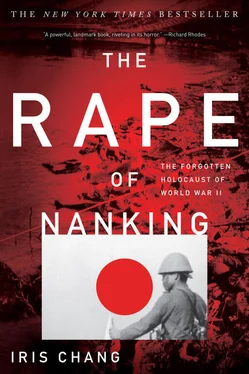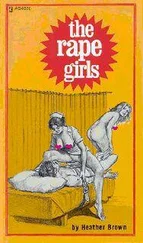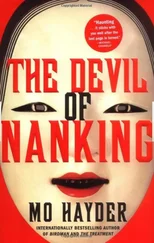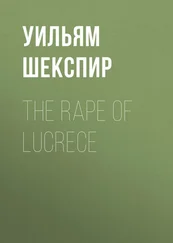Kröger had stopped by to tell Rabe that Chungshan Road was littered with weapons and supplies that the Chinese military had left behind during its retreat. Someone had even abandoned a bus, offering it for sale for twenty dollars.
“Do you think someone will take it?” Kröger asked.
“But Christian, how can they?” Rabe said.
“Na. I ordered the man to come into my office in the morning.”
Finally, the din around his house began to diminish. The exhausted Rabe, who had not had time even to change clothes for two days, lay back in bed, trying to relax as the society he knew and loved collapsed around him. He knew that the Ministry of Communication building was burning down and that the city would fall any minute. Rabe reassured himself that things would only get better, not worse, from this point on. “You don’t have to be scared of the Japanese,” his Chinese colleagues had told him. “As soon as they have taken over the city, peace and order will prevail—the rail connections with Shanghai will be quickly rebuilt and the stores will return to their normal functions.” Before he fell asleep, Rabe thought, “Thank God that the worst has been overcome!”

The next morning Rabe awoke to the sound of yet another air raid. Apparently not all of the Chinese army had been forced from of the city, he thought. It was only 5:00 A.M., so he lay down again. Like most people in the city, Rabe had become so jaded by air raids that the blasts no longer bothered him.
Later that morning Rabe explored the city to check out the extent of the damage. In the streets lay numerous Chinese corpses, many of them civilians who had been shot in the back. He watched a group of Japanese soldiers push their way into a German coffeehouse. When Rabe chastised them for stealing, pointing to the German flags on the house, an English-speaking Japanese soldier snapped: “We are hungry! If you want to complain, go to the Japanese embassy. They will pay for it!” The Japanese soldiers also told Rabe that their supply column had not arrived, and they could not count on the column for any nourishment even if it did arrive. Later Rabe learned that the soldiers looted the coffeehouse, then set it afire.
Worse was to come. In the distance, Rabe saw Japanese soldiers marching north from the south side of Nanking to occupy the rest of the city. To avoid them, he immediately drove north and reached the main street of the city, Chungshan Road, stopping at the Red Cross hospital in the Foreign Ministry. The Chinese staff had fled the premises, and bodies were everywhere—clogging the rooms, corridors, and even the exits from the hospital.
That day Rabe encountered the remains of the Chinese army—hungry and exhausted stragglers who had failed to cross the Yangtze River to safety. Driving through Shansi Road Circle, he met four hundred Chinese troops, all of them still armed, marching in the direction of the advancing Japanese army. It was then that Rabe had a sudden “humanitarian impulse” that was to haunt his conscience for months, if not years, afterwards. Warning them about the Japanese troops to the south, Rabe advised the Chinese soldiers to throw away their machine guns and join the refugees in the Safety Zone. After a short discussion, they agreed and followed Rabe into the zone.
Similarly, when hundreds of Chinese soldiers found themselves trapped on the northern side of the city, unable to secure passage across the river, many broke into the Safety Zone, begging the American and European administrators to save their lives. The committee members were uncertain as to whether they should help them. After all, they had created the zone as a sanctuary for civilians, not soldiers. The committee tried to resolve the dilemma by addressing the issue with Japanese army headquarters but got no further than a captain on Han Chung Road.
Moved by the plight of the soldiers, the committee eventually caved in to their pleas. Like Rabe, they told the soldiers that if they laid down their arms, the Japanese might treat them mercifully. Then they helped the soldiers disarm and housed them in various buildings within the neutral area. In the confusion, many of the soldiers stripped off their uniforms and mingled with the civilians in the zone.
The next day John Rabe wrote a long letter explaining the situation to a Japanese military commander. He begged the Japanese to exercise mercy toward the former soldiers and to treat them humanely according to the recognized laws of war. To Rabe’s great relief, a Japanese officer promised him that the lives of the Chinese soldiers would be spared.
But relief turned into horror when the Japanese betrayed Rabe and seized the disarmed soldiers for execution. If Rabe had hoped that the Japanese would not be able to separate the troops from the hundreds of thousands of civilians, he was sorely mistaken. The Japanese detected virtually every one of the former soldiers by examining their hands, knowing that the daily use of guns caused calluses on certain areas on the fingers of soldiers. They also examined shoulders for backpack marks, foreheads and hair for indentations from military caps, and even feet for blisters caused from months of marching.
During a staff conference the night of December 14, the committee learned that the Japanese had rounded up thirteen hundred men in a Safety Zone camp near the headquarters to shoot them. “We knew that there were a number of ex-soldiers among them, but Rabe had been promised by an officer that afternoon that their lives would be spared,” George Fitch, the YMCA representative, wrote in his diary of the incident. “It was now all too obvious what they were going to do. The men were lined up and roped together in groups of about 100 by soldiers with bayonets fixed; those who had hats had them roughly torn off and thrown to the ground—and then by the lights of our headlights we watched them marched away to their doom.”
“Did I have the right to act that way?” Rabe wrote later of his decision to quarter the soldiers in the zone. “Did I handle that correctly?”
For the next few days Rabe watched helplessly as the Japanese dragged thousands more soldiers from the zone and executed them. The Japanese killed thousands of innocent men who happened to have calluses on their fingers, foreheads, or feet—men who were ricksha coolies, manual laborers, and police officers. Rabe later witnessed the Red Swastika Society, a charitable Buddhist organization in the city, pull more than 120 corpses from a single pond. (In a later report, Rabe pointed out that several ponds in Nanking actually disappeared because they were so filled with corpses.)
As both head of the International Committee and local head of the Nazi Party, a position that was certain to carry some weight with the Japanese authorities, Rabe wrote letter after letter to the Japanese embassy. At first he was unfailingly polite, toning down his anger because of his perceived obligation, as a German citizen and Nazi leader, to maintain the relationship between the two embassies. He asked the American members of the committee to let him review their letters to the Japanese embassy so that he could “put some honey” into them as well. He maintained his polite tone in his personal visits to the embassy.
In turn, the Japanese diplomats received Rabe’s letters and visits with gracious smiles and official courtesy, but in the end he always received the same answer: “We shall inform the military authorities.” As days passed, each bringing its own unrelenting onslaught of fresh atrocities, Rabe’s written communication to the Japanese grew increasingly hostile, punctuated with exclamations of outrage:
All 27 Westerners in the city at that time and our Chinese population were totally surprised by the reign of robbery, rapine, and killing initiated by your soldiers on the 14th!
Читать дальше












